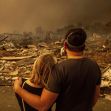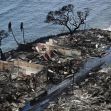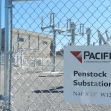A second lawsuit against Hawaiian Electric Industries, Hawaiian Electric Light Company, and Maui Electric Company has been filed following the Maui wildfire that has killed over 100 people. Despite being the second lawsuit filed, it will not be the last as more complaints are in the process of being filed in the coming days and weeks. At the center of all these lawsuits has been Maui’s major power suppliers.
This second lawsuit was filed by Morgan & Morgan on behalf of Lahaina fire victims. Purportedly the largest personal injury lawsuit in the nation, the law firm released a statement last week that read in part, “At this time, it has been confirmed that over 100 people have died, with hundreds to thousands having suffered injuries, and more than 2,500 homes and businesses destroyed. These numbers are expected to dramatically increase. Morgan & Morgan is representing victims of the Lahaina fire who seek compensation and damages for the injuries, pain and suffering, damage to and loss of property, and loss of income that they’ve experienced as a result of the fire.”
Their lawsuit accuses the three electric companies of knowingly having overhead power lines that posed a significant fire hazard during weather events including high winds, drought, and other inclement weather conditions.
The law firm maintains that despite the state of Hawaii being in a severe drought leading up to the fire, the electric companies “failed to de-energize their electrical lines in a timely manner.”
The complaint takes issues with power lines that were removed from underground and placed overhead as a result of Hurricane Lane in 2018. After the hurricane, the underground transmission lines were never moved back underground, which could have potentially prevented the fire from causing the devastation that ensued.
While the law firm points out that natural events like wildfires can be difficult to prevent or mitigate, in the case of the Lahaina Fire, their complaint maintains that had the electric companies been more proactive with their infrastructure and paid more attention to climate conditions and how that infrastructure would react with changing climate conditions, the severity of the Lahaina Fire could have been mitigated.
This lawsuit follows the first complaint brought forward by the law firm Singleton Schreiber. This complaint also accuses the same defendants of negligence which ultimately led to factors that contributed to the blaze.
The Lahaina fire has been recorded as the worst fire in U.S. history over the past 100 years. Per the latest data, 114 individuals have perished in the fire. According to the mayor, an estimated 850 people are still unaccounted for. As the blaze ravished through the town, residents were awoken in the middle of the night with little to no warning. Many residents desperately fled to the ocean to seek shelter from the fire.
The county of Maui shared in a news release earlier this week that the fire burned an estimated 2,170 acres, and while the fires are still burning and are contained, they don't pose any active threats as of now.
According to preliminary numbers released by the University of Hawaii's Pacific Disaster Center, at least 2,200 buildings were destroyed, 86% of which were residential buildings. It's estimated that the cost to rebuild the island sits at around $5.52 billion.
While the damage is still unfolding throughout Maui and displaced residents are figuring out how to move forward, homeowners and residents are gearing up for the legal action that's expected to come.
One legal strategy that’s been floated is whether plaintiffs can hold the electric companies accountable even if they're unable to prove negligence. In 2020, this strategy helped victims of California wildfires secure compensation from PG&E Corp. after the power provider was pushed into bankruptcy. For Hawaii plaintiffs to be successful, however, the determination needs to be made whether the Hawaiian electric companies functioned as a government agency or a private entity. Hawaiian Electric currently uses both private and public lands to supply electric power to the public.
Julia Bryant, fire litigation attorney at Singleton Schreiber, shares the sentiment that residents, victims, and their loved ones hold. "It's truly devastating, the community has suffered such significant historical and environmental losses." Bryant points out that the fire has caused irreversible damage to one of the state's most historical landmarks. “The damage to the land and vegetation is overwhelming. Most importantly, the loss of life that the community is now grieving can never be remedied."






